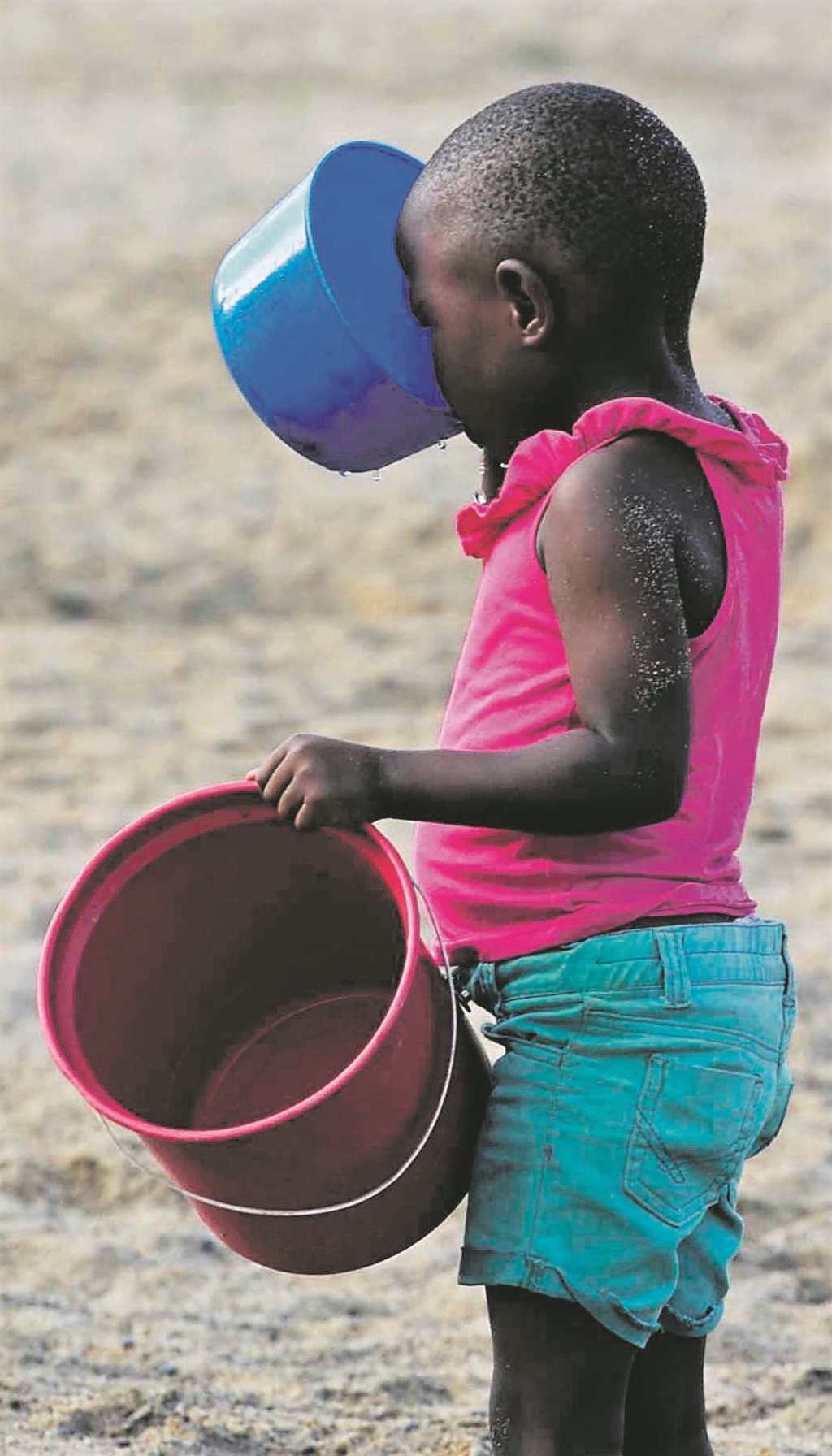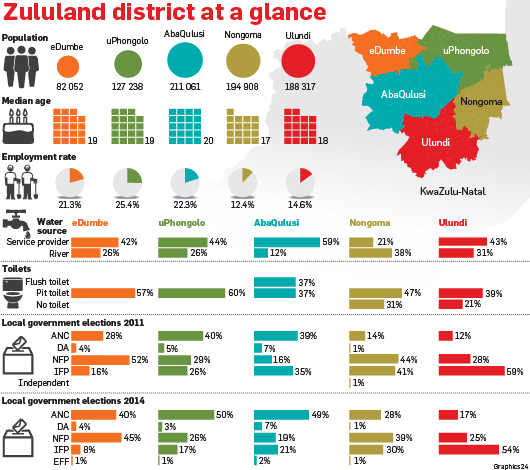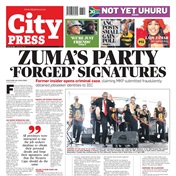
This is the first episode of the eighth series of City Press’ Tatane Project, named in honour of slain service-delivery activist Andries Tatane.
Gogo Ntshaba spits out her words like they’re bitter pumpkin seeds as she digs for water in the dry bed of the Black Umfolozi River.
The 60-year-old looks far older than the years she’s lived in KwaMusi Village on the river’s bank.
Ntshaba, who was born in the village situated in the heart of the Zululand District Municipality, is disillusioned and angry as she scoops water out of a hole she dug in the river bed with her 15-year-old granddaughter, Nompilo Luthuli.
Ntshaba’s hair, which peeps out from under her woollen hat, is white and burnt by age and exposure to the sun that has devastated Zululand since October last year, when the last rains fell.
The islands that dotted the Umfolozi five years ago, when City Press first visited the area to monitor service delivery ahead of the 2011 local government elections, are now a single swathe of sand. Grass grows in the deeper sections of the river where livestock used to drink. The shallow pools where residents of KwaMusi and Silver, who are still waiting to be connected to the municipality’s piped water supply, drew water for their homes and washed their clothes are now sandbanks. The only water left is about 50cm under the river bed, seared to the colour of concrete.
“It hasn’t rained since October,” says Ntshaba. “There is no water in the river. It has been dry since December. We have to dig here in the river for water because we don’t get anything from the waterkan [municipal water tanker]. There has been no waterkan that has come here since the river stopped.”
There is no tap water in KwaMusi, one of the communities where residents’ water access is no better than it was in 2011, when water provision was the main promise made by candidates canvassing for votes.
The district municipality plans to join it to its network of water pipelines connecting villages to the series of reservoirs that are being built by 2024. Until then, Ntshaba and others get water the way their grandparents did – from the Umfolozi.
The residents have had electricity since they were added to Zululand’s grid in 2009. The district’s key functions are providing water, sewerage and electricity to the areas around the towns of Ulundi, Nongoma, Vryheid, Pongola and eDumbe.
They use pit toilets dubbed “Magwazas”, named after a long-serving former mayor, the National Freedom Party leader Zanele Magwaza-Msibi, who was replaced by Mpiyakhe Hlatshwayo when she became deputy science and technology minister in President Jacob Zuma’s Cabinet.
Ntshaba says that over the years the river has gone from being a home to crocodiles to a dry wasteland.
“This is the first time in my life I have seen this,” she says.
“Zululand has done nothing for us. I’ve voted every time. I’m not going to vote any more. The last time they came here to promise us water and houses. The only thing that has happened is that the river has dried up. It is like we voted for the drought and for the river to go dry. I won’t vote again.”
Luthuli comes home from school each day to dig for water for her family. She says she’ll vote when she’s older for a party that can give her water and a home.
“I want government to give us water and a house. I want a job,” she says. “This water is bad. It makes our stomachs run.”
Ntshaba is angry that her granddaughter is forced to relive her hardships. “This child is having to do the things I did when I was her age. She has to come to the same river I came to when I was her age. This is not right.
“Ever since I started voting, things have gotten worse here. It’s as if ... if we vote, we suffer.”
A little further upriver, Noxolo Kunene (20) and Thenjiwe Shandu (18) wash clothes in buckets filled with water that was dug out of the river bed. It’s a daily chore that they have no choice but to endure. Kunene, who wants to be a teacher when she finishes school, and Shandu, who wants to become a lawyer, don’t have running water in their part of KwaMusi. There are communal standpipes, but those ran dry in 2014.
Neither has yet decided whether to vote this year.
“We want roads; we want water at home; we want bursaries to study further,” says Kunene.
“This place needs to progress. We need to have jobs. We need to progress.”
Shandu says: “I don’t know yet if I will vote. It’s hard because life is difficult for us here and nobody does anything to change things. There is no change for us.”
Throughout the arid 14 800km2 district, water is now foremost in people’s minds.
When political parties hit the campaign trail after finalising their candidates, water will again be the hardest issue to address.
There has been political instability in the district municipality since the ANC/National Freedom Party alliance came to power in 2011, ousting the Inkatha Freedom Party. But the ongoing drought has had a far worse impact on residents than anything else.
Since 2013, the municipality has added 11 900 households (about 60 700 people) to the water system and provided another 20 730 households (about 105 700 people) with toilets, at a cost of R690 million, which it received in grants from central government.
It has begun work on 10 water projects, which will ensure that every household has access to piped drinking water.
The roads linking the towns in the districts are full of evidence of the water roll-out. The stretch from Ulundi to Nongoma is like a continuous building site dotted with schools. Massive water pipes stand ready to be laid, quarries of local stone dot the hillsides, and construction vehicles bring traffic to a crawl in 35°C heat.
But repeated requests for interviews with the leadership and management of Zululand District Municipality go unanswered.
Just outside Nongoma, a crew testing the piping linking the roadside villages to the Usuthu water project, which is close to coming online, is taking a break. The workers are all locals working for contractors brought in by the municipality, and they’re reticent to express their thoughts on voting.
Sifiso Ngcobo (26) from Izwilisha Village, outside Nongoma, is the most talkative of the five-man team.
A father of two, Ngcobo’s current job – he started 14 months ago – is his first and he’s pretty upbeat about it, despite the heat, low wages and hard graft. He’s going to vote, but won’t say who he’s supporting.
“Government needs to do a lot here in the rural areas. Water is the biggest thing. We need water, roads and good schools. There are no houses if you can’t build it yourself. There are no street lights at night here and crime is a problem. These are things that will make me vote for a party,” he says.
Ngcobo doesn’t have water at home and the project he’s working on won’t benefit his neighbourhood, but he’s confident he’ll eventually be able to open a tap at his home and fill a glass with water.
“It is nice to know that the job I am doing will give people water. It feels nice. Before this project, I had no job. I’m happy to have it, but the money should be more. As long as they are building water pipes and dams, there will be work for us, so we are happy.”
TALK TO US
Do you live in the area? How has the drought affected you?
SMS us on 35697 using the keyword WATER and tell us what you think. Please include your name and province. SMSes cost R1.50
Throughout the arid 14 800km2 district, water is now foremost in people’s minds.
When political parties hit the campaign trail after finalising their candidates, water will again be the hardest issue to address.
There has been political instability in the district municipality since the ANC/National Freedom Party alliance came to power in 2011, ousting the Inkatha Freedom Party. But the ongoing drought has had a far worse impact on residents than anything else.
Since 2013, the municipality has added 11 900 households (about 60 700 people) to the water system and provided another 20 730 households (about 105 700 people) with toilets, at a cost of R690 million, which it received in grants from central government.
It has begun work on 10 water projects, which will ensure that every household has access to piped drinking water.
The roads linking the towns in the districts are full of evidence of the water roll-out. The stretch from Ulundi to Nongoma is like a continuous building site dotted with schools. Massive water pipes stand ready to be laid, quarries of local stone dot the hillsides, and construction vehicles bring traffic to a crawl in 35°C heat.
But repeated requests for interviews with the leadership and management of Zululand District Municipality go unanswered.
Just outside Nongoma, a crew testing the piping linking the roadside villages to the Usuthu water project, which is close to coming online, is taking a break. The workers are all locals working for contractors brought in by the municipality, and they’re reticent to express their thoughts on voting.
Sifiso Ngcobo (26) from Izwilisha Village, outside Nongoma, is the most talkative of the five-man team.
A father of two, Ngcobo’s current job – he started 14 months ago – is his first and he’s pretty upbeat about it, despite the heat, low wages and hard graft. He’s going to vote, but won’t say who he’s supporting.
“Government needs to do a lot here in the rural areas. Water is the biggest thing. We need water, roads and good schools. There are no houses if you can’t build it yourself. There are no street lights at night here and crime is a problem. These are things that will make me vote for a party,” he says.
Ngcobo doesn’t have water at home and the project he’s working on won’t benefit his neighbourhood, but he’s confident he’ll eventually be able to open a tap at his home and fill a glass with water.
“It is nice to know that the job I am doing will give people water. It feels nice. Before this project, I had no job. I’m happy to have it, but the money should be more. As long as they are building water pipes and dams, there will be work for us, so we are happy.”




 Publications
Publications
 Partners
Partners














